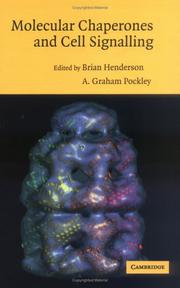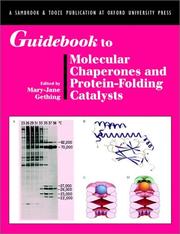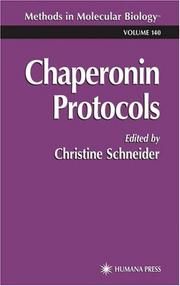| Listing 1 - 10 of 26 | << page >> |
Sort by
|

ISBN: 9780511546310 9780521836548 9780521177474 9780511345159 0511345151 0511546319 0521836549 0521177472 1281108480 9781281108487 1107150094 9786611108489 1139130706 0511344813 0511344414 0511344023 Year: 2005 Publisher: Cambridge, UK New York Cambridge University Press
Abstract | Keywords | Export | Availability | Bookmark
 Loading...
Loading...Choose an application
- Reference Manager
- EndNote
- RefWorks (Direct export to RefWorks)
Originally published in 2005, this book reviews understanding of the biological roles of extracellular molecular chaperones. It provides an overview of the structure and function of molecular chaperones, their role in the cellular response to stress and their disposition within the cell. It also questions the basic paradigm of molecular chaperone biology - that these proteins are first and foremost protein-folding molecules. Paradigms of protein secretion are reviewed and the evolving concept of proteins (such as molecular chaperones) as multi-functional molecules for which the term 'moonlighting proteins' has been introduced is discussed. The role of exogenous molecular chaperones as cell regulators is examined and the physiological and pathophysiological role that molecular chaperones play is described. In the final section, the potential therapeutic use of molecular chaperones is described and the final chapter asks the question - what does the future hold for the extracellular biology of molecular chaperones?
Molecular chaperones. --- Chaperone proteins --- Chaperones, Molecular --- Chaperonins --- Proteins
Book
ISBN: 9783031147401 Year: 2023 Publisher: Cham Springer International Publishing :Imprint: Springer
Abstract | Keywords | Export | Availability | Bookmark
 Loading...
Loading...Choose an application
- Reference Manager
- EndNote
- RefWorks (Direct export to RefWorks)
Molecular chaperones. --- Chaperone proteins --- Chaperones, Molecular --- Chaperonins --- Proteins
Book
ISBN: 1281046442 9786611046446 0080528880 Year: 1996 Publisher: San Diego, California : Academic Press,
Abstract | Keywords | Export | Availability | Bookmark
 Loading...
Loading...Choose an application
- Reference Manager
- EndNote
- RefWorks (Direct export to RefWorks)
The first of its kind, this volume presents the latest research findings on the chaperonins, the best studied family of a class of proteins known as molecular chaperones. These findings are changing our view of some fundamental cellular processes involving proteins, especially how proteins fold into their functional conformations.Key Features* Origins of the new view of protein folding* Prokaryotic chaperonins* Eukaryotic chaperonins* Evolution of the chaperonins* Refolding of denatured proteins* Organelle biosynthesis* Biomedical aspects
Molecular chaperones. --- Proteins. --- Chaperone proteins --- Chaperones, Molecular --- Chaperonins --- Proteins --- Proteids --- Biomolecules --- Polypeptides --- Proteomics
Book
ISBN: 1616684593 9781616684594 161668173X 9781616681739 Year: 2010 Publisher: New York
Abstract | Keywords | Export | Availability | Bookmark
 Loading...
Loading...Choose an application
- Reference Manager
- EndNote
- RefWorks (Direct export to RefWorks)
Molecular chaperones. --- Endoplasmic reticulum. --- Cell organelles --- Chaperone proteins --- Chaperones, Molecular --- Chaperonins --- Proteins

ISBN: 9786610965144 0191547271 1280965142 0585483639 9780585483634 6610965145 9780191547270 9781280965142 1383031126 0198599498 019859948X Year: 1997 Publisher: Oxford New York Oxford University Press
Abstract | Keywords | Export | Availability | Bookmark
 Loading...
Loading...Choose an application
- Reference Manager
- EndNote
- RefWorks (Direct export to RefWorks)
The precise shape of a protein is a crucial factor in its function. Molecular chaperones and protein folding catalysts bind to develop proteins in the cell and ensure correct folding and transport. This guide catalogues 200 such molecules.
Molecular chaperones. --- Protein folding. --- Folding of proteins --- Proteins --- Chaperone proteins --- Chaperones, Molecular --- Chaperonins --- Folding --- Conformation --- Catalysts --- Molecular chaperones --- Protein folding

ISBN: 0121821919 9780121821913 Year: 1998 Volume: 290 Publisher: New York, NY ; London : Academic Press,
Abstract | Keywords | Export | Availability | Bookmark
 Loading...
Loading...Choose an application
- Reference Manager
- EndNote
- RefWorks (Direct export to RefWorks)
Chaperones [Molecular ] --- Chaperonnen [Moleculaire ] --- Chaperons moléculaires --- Moleculaire chaperonnen --- Molecular chaperones --- Basic Sciences. Chemistry --- Biochemistry --- Proteins and Enzymes --- Proteins and Enzymes. --- Protein folding --- Proteins, chaperonins --- Molécules chaperonnes

ISBN: 0896037398 0585330743 9786610820528 1280820527 1592590616 Year: 2000 Publisher: Totowa, NJ : Humana Press : Imprint: Humana,
Abstract | Keywords | Export | Availability | Bookmark
 Loading...
Loading...Choose an application
- Reference Manager
- EndNote
- RefWorks (Direct export to RefWorks)
In Chaperonin Protocols, Christine Schneider has assembled a unique collection of readily reproducible protocols for the study of chaperonins, intracellular proteins critical to many biological processes. Written by experienced investigators who have successfully honed their methods to a fineness, the protocols focus on the purification of chaperonins from different species along with their corresponding cofactors, and on chaperonin activity assays for in vivo as well as in vitro work. Many activity assays are given for GroEL, which can also be applied to mitochrondrial Hsp60. There are also assays for the eukaryotic chaperonin TRiC and handy methods-for example, one for preparing labeled probes-that can be used for various purposes and prove helpful in numerous different procedures. Critically important to a greater understanding of such disorders as cystic fibrosis, Alzheimer's disease, and BSE, Chaperonin Protocols offers both novice and experienced investigators fast access to today's best and most productive chaperonin methods, all explained in step-by-step detail to ensure robust and reproducible results.
Molecular chaperones --- Purification --- Molecular biology. --- Molecular biochemistry --- Molecular biophysics --- Biochemistry --- Biophysics --- Biomolecules --- Systems biology --- Chaperone proteins --- Chaperones, Molecular --- Chaperonins --- Proteins --- Biochemistry. --- Biochemistry, general. --- Biological chemistry --- Chemical composition of organisms --- Organisms --- Physiological chemistry --- Biology --- Chemistry --- Medical sciences --- Composition
Book
ISBN: 1493911309 1493911295 Year: 2014 Publisher: New York, NY : Springer New York : Imprint: Springer,
Abstract | Keywords | Export | Availability | Bookmark
 Loading...
Loading...Choose an application
- Reference Manager
- EndNote
- RefWorks (Direct export to RefWorks)
Molecular chaperones are a fundamental group of proteins that have been identified only relatively recently. They are key components of a protein quality machinery in the cell which insures that the folding process of any newly-synthesized polypeptide chain results in the formation of a properly folded protein and that the folded protein is maintained in an active conformation throughout its functional lifetime. Molecular chaperones have been shown to play essential roles in cell viability under both normal and stress conditions. Chaperones can also assist in the unfolding and degradation of misfolded proteins and in disaggregating preformed protein aggregates. Chaperones are also involved in other cellular functions including protein translocation across membranes, vesicle fusion events, and protein secretion. In recent years, tremendous advances have been made in our understanding of the biology, biochemistry, and biophysics of function of molecular chaperones. In addition, recent technical developments in the fields of proteomics and genomics allowed us to obtain a global view of chaperone interaction networks. Finally, there is now a growing interest in the role of molecular chaperones in diseases. This book will provide a comprehensive analysis of the structure and function of the diverse systems of molecular chaperones and their role in cell stress responses and in diseases from a global network perspective. .
Molecular chaperones. --- Chaperone proteins --- Chaperones, Molecular --- Chaperonins --- Proteins --- Biological models. --- Biochemistry. --- Medicine. --- Systems Biology. --- Protein Science. --- Biomedicine general. --- Clinical sciences --- Medical profession --- Human biology --- Life sciences --- Medical sciences --- Pathology --- Physicians --- Biological chemistry --- Chemical composition of organisms --- Organisms --- Physiological chemistry --- Biology --- Chemistry --- Models, Biological --- Composition --- Systems biology. --- Proteins . --- Biomedicine, general. --- Health Workforce --- Proteids --- Biomolecules --- Polypeptides --- Proteomics --- Computational biology --- Bioinformatics --- Biological systems --- Molecular biology
Book
ISBN: 9783319172118 3319172107 9783319172101 3319172115 Year: 2015 Publisher: Cham : Springer International Publishing : Imprint: Springer,
Abstract | Keywords | Export | Availability | Bookmark
 Loading...
Loading...Choose an application
- Reference Manager
- EndNote
- RefWorks (Direct export to RefWorks)
The book Heat Shock Protein-Based Therapies provides the most up-to-date review on new heat shock protein-based mechanisms used in the therapy and treatment of various human disorders and diseases, including cancer, muscular atrophy, neurodegenerative disorders (Alzheimer's Disease, Multiple Sclerosis) and infectious diseases (HIV, periodontal disease). Written by leaders in the field of heat shock protein research, the chapters systematically and in a step wise fashion takes the reader through the fascinating sequence of events by which mechanisms dependent on heat shock proteins are targeted. The chapters also provide answers as to HSP biological significance to the host. This book is a must read for graduate and postgraduates in the field of Drug Development, Biotechnology, Pharmaceutical Industry, Phytomedicine, Biology (plant and mammal), Biochemistry (pro- and eukaryotic), Oncology, Immunology, Microbiology, Exercise Medicine, Physiology, Inflammatory diseases, Autoimmunity, Pharmacology and Pathology.
Biomedicine. --- Biomedicine general. --- Life Sciences, general. --- Science, general. --- Medicine/Public Health, general. --- Medicine. --- Science (General). --- Life sciences. --- Médecine --- Sciences de la vie --- Molecular chaperones. --- Proteins -- Physiological transport. --- Proteins --- Physiological transport. --- Chaperone proteins --- Chaperones, Molecular --- Chaperonins --- Science. --- Science, Humanities and Social Sciences, multidisciplinary. --- Biosciences --- Sciences, Life --- Science --- Clinical sciences --- Medical profession --- Human biology --- Life sciences --- Medical sciences --- Pathology --- Physicians --- Biomedicine, general. --- Health Workforce
Book
ISBN: 3319747150 3319747142 Year: 2018 Publisher: Cham : Springer International Publishing : Imprint: Springer,
Abstract | Keywords | Export | Availability | Bookmark
 Loading...
Loading...Choose an application
- Reference Manager
- EndNote
- RefWorks (Direct export to RefWorks)
The book Regulation of Heat Shock Protein Responses provides the most comprehensive review on contemporary knowledge on the regulation of HSP responses and its consequences to human diseases and disorders. Using an integrative approach to understanding the regulation of HSP responses, the contributors provide a synopsis of novel mechanisms by which HSP responses are regulated under normal physiological and pathophysiological conditions. Key basic and clinical research laboratories from major universities and academic medical hospitals around the world contribute chapters that review present research activity and importantly project the field into the future. The book is a must read for researchers, postdoctoral fellows and graduate students in the fields of Translational Medicine, Human Physiology, Biotechnology, Molecular Medicine, Infectious Diseases and Pathology.
Medicine. --- Human genetics. --- Pharmaceutical technology. --- Biomedicine. --- Pharmaceutical Sciences/Technology. --- Human Genetics. --- Pharmaceutical laboratory techniques --- Pharmaceutical laboratory technology --- Technology, Pharmaceutical --- Technology --- Genetics --- Heredity, Human --- Human biology --- Physical anthropology --- Clinical sciences --- Medical profession --- Life sciences --- Medical sciences --- Pathology --- Physicians --- Heat shock proteins. --- Molecular chaperones. --- Proteins --- Physiological transport. --- Chaperone proteins --- Chaperones, Molecular --- Chaperonins --- Stress proteins
| Listing 1 - 10 of 26 | << page >> |
Sort by
|

 Search
Search Feedback
Feedback About UniCat
About UniCat  Help
Help News
News